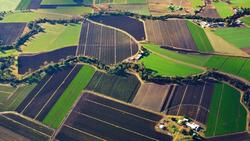Report says overseas investors should be allowed to buy our farms
Restrictions on foreign investors buying Aussie farms should be scrapped to clear the way for more overseas investment, a new report has found.
New hurdles on foreign investment put in place by the Federal Government last year following growing public concern have been slammed by the Productivity Commission, which found them to not be in the national interest and anti-jobs and economic growth.
Its draft report on agriculture regulation, released today, calls for the sale of any farmland or agribusiness worth less than $250 million to foreign interests to be exempt from any review process.
Tens of millions of hectares of Australian farmland is owned by overseas interests, including investors from China, the US, UK, Argentina, Switzerland, Qatar, the Philippines and Germany.
Chinese investors have bought dairy farms across Victoria and Tasmania in the past few years, while Qatar’s government-owned investment giant Hassad owned around 40,000ha of grazing land on the South Australia-Victorian border.
While there are disputes over how much Aussie farmland is in foreign hands, the most recent figures, from 2014, the put the total at 11 per cent.
Former prime minister Tony Abbott last year reduced the scrutiny threshold for the sale of farmland to foreigners from $252 million to a cumulative $15 million, and introduced a register of foreign owners.
The report is likely to outrage a number of prominent independent politicians such as Pauline Hanson, Bob Katter and Nick Xenophon, who have all railed against what they see as “foreign land grabs”.
The Productivity Commission report found Australian farmers were straining under a heavy burden of regulation, which should be removed.
Farming and business lobby groups have called for more foreign investment, with estimates that a 10 per cent increase over the next decade could grow the economy by more than $16 billion.
The report found that lower thresholds for investments had increased the cost and complexity of investing in Australian agriculture.
This was deterring foreign investment without offsetting the public benefits.
“The recent tightening of the foreign investment regimen for agriculture by the Australian Government also lacks a sound policy justification,” commissioner Paul Lindwall said
“These regulations are not in the public interest and should be unwound.”
Australia was last year ranked in a global study as the most restrictive country out of 59 surveyed in terms of foreign investment in agriculture.













